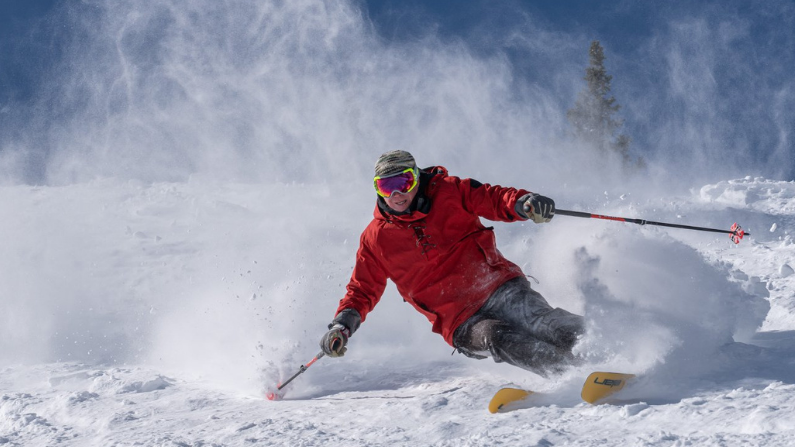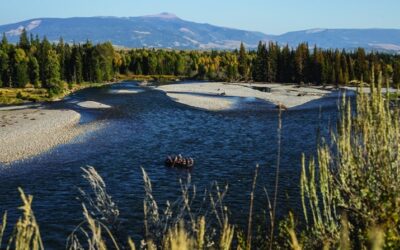Dan Egan is one of the extreme ski pioneers who was featured in more than a dozen Warren Miller films in the 1980s and ‘90s. Egan’s career also paralleled the geopolitical landscape of the era, when he skied everywhere from the Berlin Wall to the Middle East to draw attention to global conflicts.
Egan’s mountain antics were documented by filmmakers and writers years before the advent of the X Games, GoPro and social media. Together with his older brother John, Egan changed how the public consumes skiing thanks to the birth of a VCR. The brothers also starred in the most viewed Warren Miller clip of all time, which captures a cornice break at Targhee.
We spoke with Egan about the release of his forthcoming book, “30 Years in a White Haze.”
COHEN: This book is written in the third person and co-written with Eric Wilbur, a sports columnist in Boston. Can you talk about why you decided to write this book in the third person when these stories are personal to you?
EGAN: Yeah, it was really a hard decision. We had these discussions for months. You know, we wanted everybody’s voice in the book to be heard. They were really personal stories, but they weren’t just my stories.
COHEN: It’s interesting to note that the book is coming out just after the release of the Warren Miller documentary, “Ski Bum.”
EGAN: That story shows a life of passion and the cost of that. So many people often don’t think about the sacrifices that people make when they choose blind ambition to keep going. When you start thinking about that you can’t have it all. What is it that you take and what is it that you leave behind?
COHEN: And you touched on some of that in your book as well, about your own life.
EGAN: You know, we always want to show the world the best, but, you know, there’s hardships along the way. And that was the most challenging part of writing “30 Years in a White Haze” for me.
COHEN: How did learning to ski on a small mountain, the Blue Hills Ski Area, with a vertical drop of just 309 feet, shaped your desire to be an extreme skier?
EGAN: Well, you know, skiing at night is a special experience, racing gates and the shadows and learning just to improvise and move boldly forward into the dark. Blue Hills was a great spot, but it wasn’t well lit. It’s the closest ski area to any major metro in the whole country. It’s three miles outside of Boston. But it was John’s bold move to leave home in 1976 to Sugarbush, Vermont that really changed my whole family’s trajectory, especially mine. I was 14 at the time and just seeing that left a huge impression on me.
COHEN: There’s an interesting story in your book about how he’s leaving for work one day. I think it must be around the same time. And he’s dressed in his work outfit, his snowsuit, and your father’s dressed in his business suit, ready to go do his job as a doctor.
EGAN: Yeah, it was such a contrast. That was the first time that I considered, oh, there’s another way to make a living. All of his ski bum friends went on to be really successful businessman, but in a very unconventional way.
COHEN: There are lots of New Englanders in Jackson and in the Northern Rockies. Why do you think so many people from back east are drawn here?
EGAN: The West, right. We’re free in the West. We’re still going to make our way to the West. So I think for the Easterners, there’s always this idea that the West holds some sort of dream or promise or something better. And of course, from the East, you know, we’re used to skiing and all different types of conditions. So when we get to a place like Jackson Hole, where it’s expansive, the conditions are great, there’s kindred spirits and a sort of like mindedness of open mindedness.
COHEN: You’ve cited a Warren Miller quote a handful of times about the importance of thinking about the beauty of a place you’re in and your role in it — to be the exclamation point on the mountain. Can you talk a little bit more about what that quote means to you and how you try to embody that?
EGAN: I think about Warren when I ski, I think about what would Warren see here. What do you see — comedy? What do you see — a sign? What do you see — backlit shot with a big plume of snow lit up behind me? And what is my place here? My joke is, you know, I’ve wasted another perfectly productive day skiing, but I’ve actually added something to the scenery.
COHEN: It’s interesting to note the role of VHS in the growth of your career. It was the technology that enabled more people to experience film, and to do so in the comfort of their own homes. The inventor of the technology actually just passed away last week, but cassette tapes and VHS technology now seems so antiquated, but clearly paved the way for what we have today with, say, GoPro and smartphones. What are your thoughts on the state of the extreme skiing film industry today?
EGAN: Warren always talked about how he didn’t need special effects. He didn’t need graphics. He was shooting beauty. He was shooting nature. And if the skier did it right, it got even better.
When you when you have the VHS tape and you have our videos sitting on the shelf in people’s homes for ten plus years and then watching them again and again, people quote me. Still.
[With VHS] you had to wait a whole year to see that footage. Even with it, there was no instant feedback on that. You never knew if the cameraman ran out of film or not. With the onset of digital and online, I think we’ve lost something. I think we’ve lost the adventure of how did you get there. The adventure of the place.
COHEN: Is there anything else you want to let listeners know about the book?
EGAN: The book is a book about family, about age, adventure. Skiing is what saved me — and killed me. The other really important piece for me is the history of extreme skiing. Patrick Vallencant and all these guys, they set the bar very alpinist. But in America, we MTV everything. We glitz. We glamor. We package. We sponsor and we sell it. And that’s what my generation did. We sold extreme skiing. We were a sport. But more, we were entertainment. We used technology, we used sponsors. We created some of the first music videos ever produced, of just raw music and action. We were jumping cliffs. We were great skiers. We were passionate and that was fun and that was entertaining and that was our brand.
Information on Egan’s book can be found at White-Haze.com.





